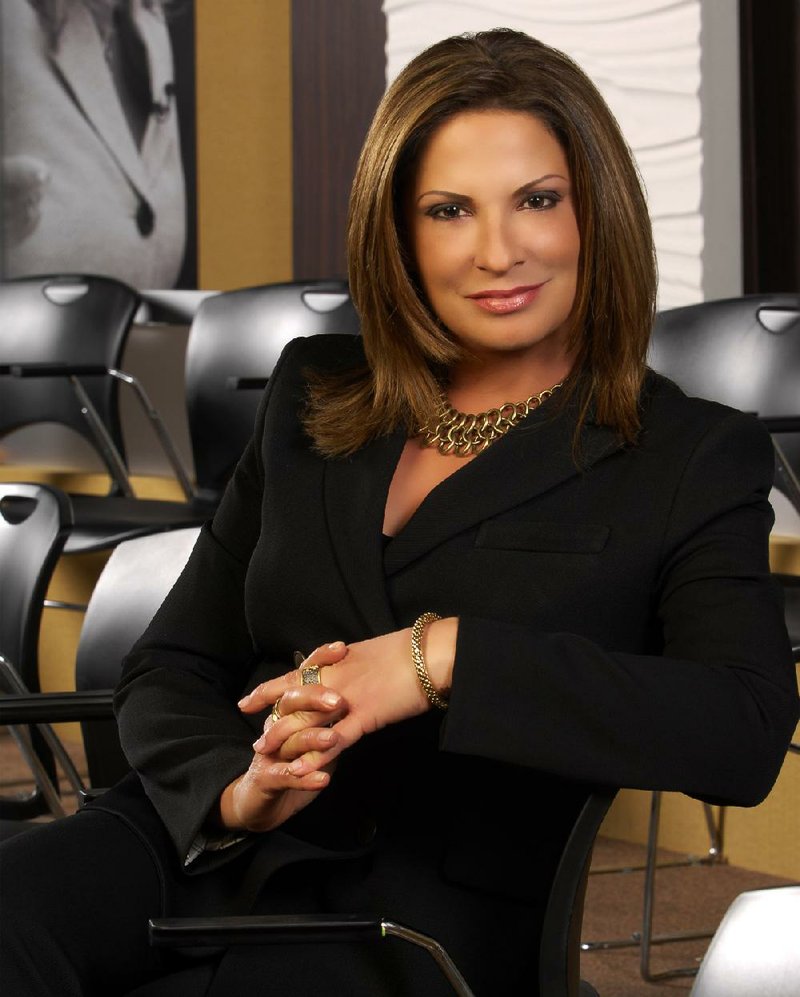LOS ANGELES — The plaintiff — a young man — is angry, feeling violated and no longer willing to be the lover of the woman standing a few feet away. Their affair is a sordid one: He’s her literary professor; she posted a humiliating sex video of him on YouTube.
The rub: Their entanglement was sanctioned by the man’s wife, a way to keep him sexually satisfied once motherhood left her unkempt — an idea that developed after she read the erotic best-selling novel Fifty Shades of Grey.
And they’re looking to Ana Maria Polo for resolution.
“Cuando juegas con fuego, uno se quema!” Polo says, scolding the defendant in Spanish with a common English idiom (when you play with fire, you’re going to get burned).
Judge Judy may be the undisputed queen of mean in the TV courtroom arena, but there’s one challenger who not only matches her sharklike disposition but comes with an added entertainment value — she can sing. This “judge” croons her own theme song.
Polo is the star attraction of Telemundo’s Caso Cerrado (Case Closed), a Miami-based Spanish-language court show that has emerged as one of the judicial reality genre’s most colorful and popular entries. She has been dubbed the “Latino Judge Judy,” a comparison she doesn’t overrule.
‘ADMIRE JUDGE JUDY’
“I have no problem with the comparison,” Polo said in English — she was born in Cuba, but raised in Miami. “I admire Judge Judy. She has a style that I find refreshing. A strong personality is something to strive for.”
There are some notable differences between the two — Polo, unlike Judy, has never been an actual judge, but she’s a legal arbiter who settles differences between litigants. And instead of an imperial black robe, Polo hands down her rulings wearing brightcolored jackets and bold prints.
Did we mention she sings the show’s theme song?
The Emmy-nominated show averages 1.2 million viewers, according to Nielsen — well below its English-language counterparts, but still impressive. Its reach is so widespread, with the show airing in 30 countries, that it’s no surprise hundreds thronged to a makeshift set during Caso Cerrado’s recent trip to the West Coast, releasing “oohs” and hoots during this particular scandalous proceeding.
Her television career isn’t too far divorced from her original ambition — she wanted to be an actress.
“The biggest actors in the world are lawyers,” she said. So she spent 20 years as a thespian of the law, becoming a lawyer and tending to cases on divorce, adoptions, custodies and domestic violence.
Then, like many rise-tofame stories, someone heard her sing and a TV judge was born. It was mid-December 2000 and Polo’s law office — Polo, Yablen & Santamarina LLP — was in the middle of a holiday party when a knock at the door came. It was a fretful producer with a court show slated to start production in January — only it had no host.
REQUEST FOR AUDITION
What led him to Polo? Someone from the show’s production company had heard Polo perform at a cafeteria opening near the Miami courthouse, and he knew she was also a lawyer.
“They thought, ‘Oh, she’s a lawyer and she doesn’t mind being in the limelight,’” Polo recalled. She ditched the party that night to go in for a casting audition. The gig was hers.
“I didn’t think it was going to go anywhere,” she said. “I would always watch the American court shows — there were and are so many. But there were close to zero Latino court shows. It seemed to me Latinos simply don’t care about this genre.”
Debuting in 2001 as Sala de Parejas (Couples’ Room), with a focus on couple squabbles, the show expanded in 2005 to include other cases, and changed its name to Caso Cerrado.
Its cases range from divorce battles and teen bullying to the outrageous: sex addiction disputes, a father and mother arguing over whether their son should wear boxers or briefs, a husband dismayed by his wife’s decision to have cosmetic surgery on her nether regions.
It’s the latest court show to surface on Telemundo — La Corte de Familia (Family Court) ended its six-season run in 2005. Alina Falcon, the network’s executive vice president of news and alternative programming, said the decision to implement an alternative to the English-language TV staple was to service the community.
RELATE TO HISPANICS
“There’s a variety of different court shows out there offering different styles and cases,” Falcon said. “Caso Cerrado does a great job of talking about cases and situations that are, in many cases, unique and relatable to the Hispanic audiences — many times the situations surround issues of immigration, family issues that arise from that.”
It has all helped the show gain notice outside the Spanish-language community. In 2010, Caso Cerrado became the first program from a Spanish-language network to be nominated for a daytime or prime-time Emmy.
The passionate cases make it to air even when those involved want no part in it. The show uses actors in cases where participants in the dispute don’t want to appear on the program.
Polo now has her sights set on a crossover. “We have a lot of bilingual viewers,” she said.
“We are working to somehow bring the concept to the general market,” Polo said. “Court shows, I think, bring to light the way we are all similar, not different. I think America is ready for my kind of court show, for my idea of justice. Justice with a human touch.”
Weekend, Pages 34 on 11/29/2012
